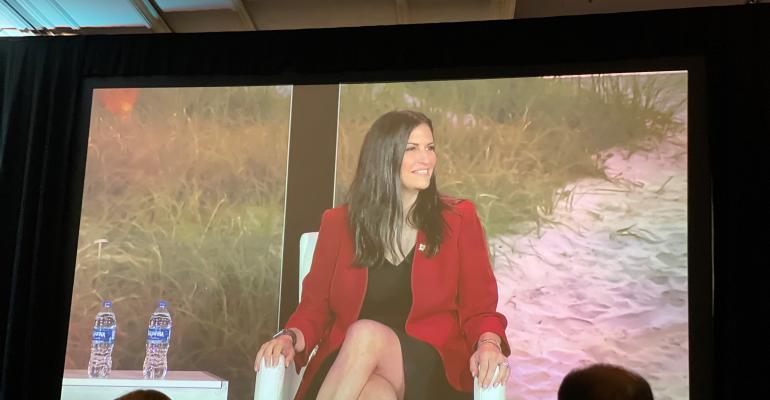Subway’s acquisition by Roark Capital made plenty of headlines in recent weeks, and with an estimated (though undisclosed) $9.6 billion price tag, it should have. That deal, however, still isn’t the biggest the industry has experienced.
That title belongs to Burger King’s $11.4 billion acquisition of Tim Hortons in 2014, which led to the formation of Restaurant Brands International. Just behind that was Inspire Brands’ $11.3 billion acquisition of Dunkin’ Brands in 2020. Yes, 2020 – not exactly a strong year for the restaurant industry, or our collective psyches. As Kate Jaspon, CFO of Inspire Brands, said during the Prosper Forum in Amelia Island, Fla., last week, “It was not a fun year.”
For her, however, this had more to do with just navigating an unprecedented crisis that devastated the industry for months. It also meant a significant amount of personal uncertainty. Jaspon called Inspire’s acquisition a “surprise,” and she turned her focus to helping employees and franchisees understand what it would mean for them, while trying to also understand what it meant for her personally, as the then-CFO of Dunkin’.
“In the heart of Covid, we paused receiving royalties, we were lobbying in DC to keep our restaurants open. My job went from reporting publicly to shareholders to trying to secure plexiglass,” she said. “It was chaotic. I didn’t want to be the CFO that takes a brand that’s been around 70 years into bankruptcy.”
Fast forward to October 2020, when Inspire Brands announced its acquisition, and the chaos continued. The deal closed on Dec. 15.
“It was the quickest close of a transaction,” she said. “Less than 45 days to close an $11.4 billion deal is insane.”
Behind the scenes, she agreed to an end date with the company, which included about a year of help with integration. Dunkin’ had been her career for nearly 25 years and Inspire already had a CFO in David Pipes. But when Pipes announced his retirement in 2021, she made the decision to “continue the journey.”
“It was important to me to make sure our employees and everything we built was successfully integrated. I also knew employees of the other brands, so it just felt right to help,” Jaspon said.
There were some surprises within that integration process, however. Dunkin’ had now become the largest brand in Inspire’s portfolio, for instance, but it also had the easiest operating model because it was 100% franchised and didn’t own its supply chain. It also added some value with its international platform, which Inspire didn’t have at the time.
“Inspire was very different. It was 93% franchised, but also owned and operated over 2,200 restaurants and that brings a different type of complexity I wasn’t used to. So, I’ve spent the past two years learning to own restaurants and the supply chain,” she said.
Inspire is also private, whereas Dunkin’ had been public since 2011. This offers some unique opportunities, particularly for a CFO.
“One of the great things about being a private company is we have the ability to make long-term investments without people questioning that. So, a lot of the tech we’re trying to build, particularly around consumer data, is very difficult to fund as a standalone company,” she said. “Coming from two brands to six brands where we can collectively share the cost of building that platform and the data that comes with it was super important. The ability to make long-term investments with owners that see the value of making them has been great for us.”
Jaspon provided an example of how the company is utilizing some of those investments across its six brands – Dunkin’, Baskin-Robbins, Buffalo Wild Wings, Sonic, Jimmy John’s, and Arby’s.
“Just think of the number of consumers we touch through (digital) channels and how we can share the learnings. So, if you have a customer at an LSU at a football game and they buy something spicy from Sonic, we can target them in the morning for a spicy sandwich at Dunkin’. Then, we know they were at LSU game, so when LSU gets to playoffs, we can encourage them to order a Baskin-Robbins LSU cake,” she said. “Behind the scenes, we’re putting all that data together. That investment is significant, and it’s something none of us would be able to do on a short-term basis.”
The scalability should continue to benefit Inspire, Jaspon said, because “when the next brand comes in, those investments will be even less expensive.”
Those benefits also expand to Inspire’s franchising model, as the company encourages franchisees to expand across its brands while maintaining some company-owned restaurants.
“Being able to test things in company restaurants and move things around is important – it proves to franchisees we have skin in the game and understand some of their pressures – but we’ll always be above 90% franchised, as far as I can see now,” she said.
Cross branding also allows Inspire to test new approaches and models. For example, if an airport operator is looking to fill a terminal, they could go with six different restaurant companies, or “just call Inspire and have each of ours go in.”
“As we continue to develop, we are bringing in new concepts, like drive-thru-only and non-traditional. Franchisees know how we perform so if they pick up another brand, they know what they’re getting from the leadership team, they’re comfortable with the unit economics and operating models,” Jaspon said. “It’s a huge growth strategy for us going forward.”
Contact Alicia Kelso at [email protected]





